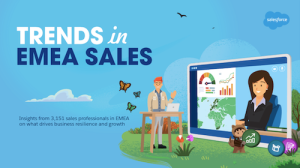Salesforce Research surveyed nearly 6,000 sales professionals from around the world (including 3,000 from EMEA) to discover:
- How sales professionals are adjusting to new expectations from buyers and their organisation.
- The evolving role of sales operations.
- New tactics and strategies driving growth and efficiency.
The results of the survey highlight key 5 trends shaping the future of sales in EMEA, at a pivotal time. Let’s unveil them in detail.
The top 5 trends shaping sales in EMEA
1. Top teams are turning insights into sales
Customer expectations are higher than ever and customers expect today’s sales reps to act as advisors and problem solvers — not just sell a product or service. According to the 4th State of Sales report:
- 91% of reps say that the current economic climate means that they need to anticipate the needs of their customers.
- 87% say that they’ve acted in an advisory role.
The vast majority of sales reps, across all performance levels, rely on publicly available news sources to inform their selling, with 88% of high performers tracking industry news and 78% of underperformers doing the same.
But high-performing sales reps are going a step beyond this by also tracking deeper, customer-specific insights with greater frequency. Top-performing sales reps are 1.3x more likely to track customer purchase history, for instance.
They also pay more attention to staffing changes, which might signal a shift in decision-making dynamics, and new competitor activity, which can enable them to tweak existing strategies and tactics. In short, high-performers are paying careful attention to the details and assessing what will strengthen their relationships with customers.
2. As business needs shift, reskilling takes priority
The impact of this year’s crises has been so intense that, in some cases, long-standing job positions may very well be obsolete. Our report shows that 73% of sales professionals have taken on new responsibilities at work. And most expect their roles to be altered far beyond the end of the pandemic.
Moreover, the majority of sales teams are adopting new key performance indicators (KPIs). This requires an additional change in mindset for those who may be used to already established objectives, metrics, and processes. To meet new business needs, organisations are reskilling and upskilling employees rather than laying them off or hiring externally. This is not only more cost-effective; it builds trust and drives productivity.
One of the biggest changes for sales teams has been the shift to remote working. We discovered that 74% of organisations have reskilled employees to sell from home. This massive shift should continue well into the future — potentially becoming the ‘new normal’ — as reps have been empowered to work from anywhere at any time.
The sales professionals who find innovative, forward-thinking ways to leverage these modes of working will be well-positioned to thrive in the new sales landscape.
3. Organisations seek greater visibility as selling goes remote
As remote working becomes standard, we’ve seen a corresponding acceleration of technologies to better connect the workforce. Sales professionals are turning to digital platforms to log activities, connect departments and functions, and enable smooth collaboration.
Sales professionals are also leveraging AI to automate repetitive, routine tasks. This gives reps more time to concentrate on selling. It’s more critical than ever — in a customer-centric era with sky-high expectations — for personalised services. In fact, one of our thought leaders at Salesforce, Tiffani Bova, calls the seller and AI “the new power couple”.
According to the report, 82% of sales leaders from organisations that have invested in AI say that AI has helped increase visibility and allows their reps to focus on more important tasks.
4. Sales Ops becomes increasingly strategic
Just as the role of sales reps is changing, so is the role of sales ops. Sales ops is becoming more strategic, using data-driven insights to create strategies, better connect teams, and improve efficiency.
- 83% of sales ops professionals say that the role is becoming more strategic.
- 88% say that sales operations play a critical role in growing the business.
During this time of unprecedented disruption, where the norms no longer apply, operational efficiency and data-driven decision-making take on special importance. And in high-performing organisations, sales operations are more than just a connector between different people and processes within the sales team. It’s also a bridge to important contacts on other teams, like account-based marketers, customer service leaders, and more. In this way, sales ops can tighten relationships to create greater efficiency.
5. Digital transformation is accelerating
The digital imperative was here before the pandemic hit us but the series of crises certainly sped things up drastically. In fact, 79% of sales leaders in Europe say that they’ve had to accelerate their digital transformation plan since 2019. Many companies were forced to implement long-term transformation strategies in a matter of months or even weeks to keep up with digitally mature competitors. In short, what did not happen over 10 years, happened in less than 6 months!
In particular, we are seeing how video conferencing tools and mobile apps have become increasingly valuable in a time of distributed work. Our report shows that sales teams in Europe have placed a high value on AI within their digital initiatives. And our researchers note that this appreciation for the value of AI comes on the heels of a significant uptick in adoption among sales teams observed in our 2018 survey.
Use cases for AI extend across many major areas. However, the technology’s most significant impact, according to salespeople, is on understanding customer needs — especially when they’re changing so rapidly.
AI’s second-largest impact is on improving forecasting accuracy — in other words, understanding opportunities — and in so doing, helping organisations make informed decisions, even as the norms change.
Top teams turn insights into sales
Strong sales have always been built on strong relationships and that’s especially true at this moment. The EMEA Mini report shows that 91% of sales reps say that current economic conditions make it important to anticipate customers’ needs. Moreover, 87% say that they act as a trusted advisor to their customers.
With so much uncertainty and fragility baked into the sales landscape, sellers need to do more than offer a product or service. They need to understand the unique needs of their individual customers.
The report also reveals that high-performers are more likely than underperformers to leverage information from international and industry news sources. They’re also more likely to track customers’ staffing changes and competitor activity.
As business needs shift, reskilling becomes a priority
Many sales organisations have seen their staffing needs change dramatically. In fact, 73% of EMEA sales professionals say that they’ve taken on new responsibilities at work.
It’s no surprise that remote working and selling from home have also seen a dramatic uptick. According to our report, 74% of leaders stated that they’re retraining field reps to sell from home. This untethering of the workforce may be a new way of working, but it can be an empowering one. Reps are no longer confined to office hours and are limited by the logistics of face-to-face selling. 
The majority of today’s leaders (59%) are reskilling their workforce rather than hiring new employees (46%). Reskilling is not only more cost-effective, but it also helps build employee loyalty and create a more agile workforce. If anything, the percentage of leaders concentrating on reskilling rather than hiring from outside seems slightly low. Especially when there are easy solutions that enable employees to learn new skills over a cup of coffee or on their morning commute.
Organisations seek visibility as selling goes remote
As more employees shift to remote working, EMEA organisations are adopting new tools and strategies to keep teams accountable and aligned. Our report shows that 74% of EMEA organisations have increased the monitoring of field reps. Moreover, 66% have increased the enforcement of activity logging and 62% have increased the length of pipeline management meetings.

It’s no wonder then, that more and more businesses are turning to digital solutions, like Sales Cloud, to help align teams and processes. Another telling statistic from the report regards the use of AI, which is on the rise everywhere. Especially in high-performing organisations.
In fact, 60% of high performers are using AI to determine what action to take on accounts (vs. 31% of underperformers); 63% are using AI to prioritise leads (vs. 34%), and 68% are using AI to log sales data and customer notes (vs. 54%).
Additionally, 82% of EMEA sales professionals say that AI improves visibility into reps’ activities. From looking at these numbers, there’s little doubt that AI can be a huge advantage in gaining visibility. It also automates routine tasks, freeing up sales reps’ time, and optimises skill sets. This helps business owners turn underperforming teams into high-performing ones.
Sales ops become increasingly strategic
Data is the engine driving economic trends in the new landscape, and sales ops have taken the wheel. Our report reveals that sales ops have become increasingly important. And its role in strategic planning has only grown.
As shown in our report, today’s sales professionals are viewing sales ops in a new light:
- 83% say that sales ops are becoming more strategic
- 88% say that it plays a critical role in growing the business
- 88% say that it plays a critical role in business continuity
Over half (55%) of respondents also state that sales operations teams are now key to defining sales strategy.

A majority of respondents also agree that the role of sales ops in strategy planning has increased. As the role of sales ops evolves, so must the training that EMEA organisations provide.
Top 5 sales tools that have become more valuable in EMEA
1. Video conferencing tools
As offices closed and workforces became decentralised, video-conferencing tools kept teams together. Businesses not only shifted meetings onto digital platforms, but they also established coffee chats, pub quizzes, brainstorming sessions, and general get-togethers.
2. Artificial intelligence
High-performing organisations are already using AI tools like Einstein to automate workflows, improve customer satisfaction, and predict outcomes. The future of AI remains limitless! It’s certain that creative organisations will find new and exciting ways to deploy AI in the near future.
3. Mobile sales apps for employees
Empowering employees with easy, on-the-go mobile tools took on new importance when lockdown measures hit. And mobile sales apps will continue to grow, even after the workforce returns to the office. Even EMEA organisations without robust IT departments have been able to develop their own low-code apps on the Salesforce Platform, simply by dragging and dropping components.
4. CRM (Customer Relationship Management) systems
The customer is king in the new climate, so companies that weren’t using CRM systems to manage their relationships have been scrambling to keep up. The rise of new adapters means that more companies are preparing themselves to meet growing customer expectations. A CRM system will help them better cope with the challenges of the current climate.
5. Sales prospecting tools
In an unpredictable climate, many businesses have been turning to sales prospecting tools to maximise efficiency, save time, and generate pipelines. Many of these tools can be integrated with other Salesforce solutions, enabling teams to get a 360-degree customer view.
The future of sales in EMEA
The past year has certainly been challenging, but sales have responded by creating workforces that are highly skilled, agile, data-driven, and empowered by new technologies and ways of working. For sales professionals, the journey to better engagement has already started.
If you would like to dig deeper into what we shared today at a high level, you can download the full 4th State of Sales.
Learn more with the State of Sales Report
The state of sales is increasingly value-driven, and it all starts with preparing the sales teams.





















